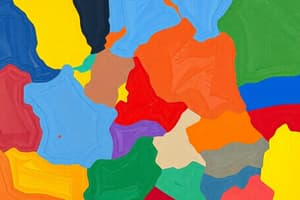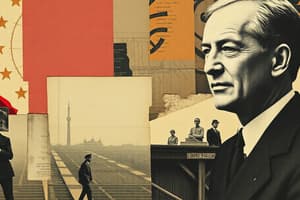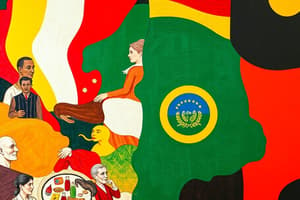Podcast
Questions and Answers
Which of the following best describes the relationship between a nation and a nation-state?
Which of the following best describes the relationship between a nation and a nation-state?
- A nation and a nation-state are synonymous, both referring to a group of people with a shared identity and a demarcated territory.
- A nation-state is a prerequisite for the formation of a nation, providing the necessary governmental structure and security.
- A nation emerges from a government's imposition of laws and order, leading to a shared identity among the governed.
- A nation is a cultural and communal entity, while a nation-state is the political manifestation of that nation, requiring both government and citizen participation. (correct)
Which statement best reflects Johann Herder's view on national identity?
Which statement best reflects Johann Herder's view on national identity?
- National identity is a construct of the ruling class to maintain power.
- A unified global culture is essential for progress, superseding national identities.
- Losing one's patriotic spirit leads to self-loss, and national identity is the ultimate human perfection. (correct)
- Individuals should prioritize personal growth over national obligations.
What is the primary role of intellectuals in the formation of a nation?
What is the primary role of intellectuals in the formation of a nation?
- To lead national movements through political action and the overthrow of existing regimes.
- To create economic policies that ensure the nation's financial stability and international competitiveness.
- To inspire loyalty, formulate national identity, and educate the population about their shared history, language, and culture. (correct)
- To establish and control the government, ensuring the deployment of weapons and maintaining law and order.
Which of the following scenarios would most likely hinder the endurance of a state, based on the principles outlined?
Which of the following scenarios would most likely hinder the endurance of a state, based on the principles outlined?
According to Friedrich Hegel, what is the relationship between a nation-state and its people's freedom and dignity?
According to Friedrich Hegel, what is the relationship between a nation-state and its people's freedom and dignity?
What was Leo von Ranke's central idea regarding nations, particularly concerning Germany?
What was Leo von Ranke's central idea regarding nations, particularly concerning Germany?
What is the relationship between inclusion and the evolution of a nation?
What is the relationship between inclusion and the evolution of a nation?
What is the ultimate goal associated with the 'Destiny of Germans' as described?
What is the ultimate goal associated with the 'Destiny of Germans' as described?
Which of the following is an example of the 'spiritual principle' of nationhood in action?
Which of the following is an example of the 'spiritual principle' of nationhood in action?
How did German intellectuals leverage the concept of Volksgeist to foster national unity and pride?
How did German intellectuals leverage the concept of Volksgeist to foster national unity and pride?
According to Ernest Renan, which factor is least important in defining a nation?
According to Ernest Renan, which factor is least important in defining a nation?
What did Ernest Renan mean when he described a nation as a 'daily plebiscite'?
What did Ernest Renan mean when he described a nation as a 'daily plebiscite'?
Which of the following scenarios best exemplifies Renan's concept of 'collective forgetting' in nation-building?
Which of the following scenarios best exemplifies Renan's concept of 'collective forgetting' in nation-building?
According to Renan, how do language and culture factor into the formation of a nation?
According to Renan, how do language and culture factor into the formation of a nation?
Which principle does Renan assert is crucial to a nation's unity?
Which principle does Renan assert is crucial to a nation's unity?
Based on Renan's view, which of the following would be a primary characteristic of a strong, enduring nation?
Based on Renan's view, which of the following would be a primary characteristic of a strong, enduring nation?
A country with multiple languages and diverse cultural practices is unifying under a new government that emphasizes equal rights and shared democratic participation. How would Renan likely view this situation?
A country with multiple languages and diverse cultural practices is unifying under a new government that emphasizes equal rights and shared democratic participation. How would Renan likely view this situation?
Which statement best reflects Renan's perspective on the relationship between history and national identity?
Which statement best reflects Renan's perspective on the relationship between history and national identity?
Flashcards
Veri Italiani
Veri Italiani
True Italians
Volksgeist
Volksgeist
National spirit or unique character of Germans.
Herder's Nationalism
Herder's Nationalism
Losing patriotic spirit is losing oneself.
Hegel's Nation-State
Hegel's Nation-State
Signup and view all the flashcards
Ranke's National Mission
Ranke's National Mission
Signup and view all the flashcards
Age of Nationalism
Age of Nationalism
Signup and view all the flashcards
Ernest Renan
Ernest Renan
Signup and view all the flashcards
Renan's Nation Definition
Renan's Nation Definition
Signup and view all the flashcards
Importance of Forgetting (Nationalism)
Importance of Forgetting (Nationalism)
Signup and view all the flashcards
Nation as a Daily Plebiscite
Nation as a Daily Plebiscite
Signup and view all the flashcards
Role of History in a Nation
Role of History in a Nation
Signup and view all the flashcards
Language & Culture in Nation Formation
Language & Culture in Nation Formation
Signup and view all the flashcards
Democracy & National Identity
Democracy & National Identity
Signup and view all the flashcards
Inclusion in a Nation
Inclusion in a Nation
Signup and view all the flashcards
Nationalism
Nationalism
Signup and view all the flashcards
Nation
Nation
Signup and view all the flashcards
Nation-State
Nation-State
Signup and view all the flashcards
Nation-State Formation
Nation-State Formation
Signup and view all the flashcards
Study Notes
- Nationalism was a significant force in the 19th century, inspiring revolutions in Europe and worldwide.
Ernest Renan
- Ernest Renan (1823-1892) was a French philosopher.
- Renan authored a celebrated essay on national identity titled "What is a Nation?"
- In his essay, Renan explored common answers to the question of national identity.
- Renan added his own perceptions on the concepts of nation and nationhood
What Defines a Nation?
- Renan focuses on the spiritual principles that form a nation
- Renan went beyond racial, linguistic, or territorial factors.
- Nations are not defined by shared bloodline or ethnicity, but by a collective will to live together and form a community.
- Nations share a history, a culture, and a vision for the future.
- Nations are built on the decision to move forward together despite past grievances.
Important Concepts
- A nation is created and recreated daily through the will of the people, which can be described as a "daily plebiscite".
- Citizens reaffirm their commitment to the community,
- The true strength of a nation is the collective will to live together and to move forward
- The past may provide a sense of common origin.
- The present and future define a nation.
- Language and culture can play a part in the formation of a nation, but are not determinative.
- Many nations comprise groups that speak different languages and follow diverse cultural practices.
- A nation's unity is tied to democratic principles, where all members have equal rights and responsibilities.
- Collective will of the people, as expressed through participation in democratic processes, is fundamental to national identity.
Exclusion vs. Inclusion
- A nation isn't static but always changing.
- A nation evolves based on the willingness of the people to accept one another as equals.
- Nations are defined by the will to include or exclude specific groups.
Conclusion
- Nationhood is a spiritual principle based on shared values and common commitments.
- This contrasts with rigid, ethno-nationalist ideas of identity.
- A nation is a spiritual, emotional, and collective endeavor.
- A nation is more than just a political or racial entity
- States will have the power to exist when people are ready to make sacrifices, abdicate personal interests, and create a moral conscience of self.
Nationalism and Intellectuals
- Nationalism is loyalty and devotion to a nation, an idea inspired and formulated by intellectuals.
- Intellectuals played a vital role in creating a nation's administration, studying nationalism in action, and educating people.
- Intellectuals focused on generating awareness about identity, uniqueness, language, history, and culture.
- This awareness enables the formation of both a nation and a nation-state.
Nation vs. Nation-State
- In a political context, there's a key difference.
- A nation refers to a group of people who are aware of a common identity, attached to a demarcated territory, design a common project for the future, and demand the right to self-rule.
- A nation-state is the joint act of government and people.
- The government represents the ambitions and values of its citizens.
- Nation states secure equal participation, duties, and privileges for all its citizens.
Formation of a Nation-State
- Nation-state formation starts with the formation of a government with distinct components.
- Establishment of government monopoly of the deployment of weapons
- Controls and secures order within its boundaries.
19th Century National Movements
- In Western Europe: In Italy there were the "Veri Italiani" (True Italians)
- In Western Europe: In Germany there was the "Volksgeist" (National Spirit).
- In Eastern Europe: In the Balkans there was Pan-Slavism.
Volksgeist
- Volksgeist is the spirit of the people.
- Volksgeist described the national character or expression of the unique nature of Germans.
- It served as the ultimate datum/starting point.
- German intellectuals explored it in its various indications,
- Intellectuals searched their past for whatever identified them as German, generated pride in their heritage, and attached exceptional value to the concept of patriotism.
German Philosophers and Nationalism
- Philosophers greatly influenced the unification of Italy and Germany.
- Johann Herder was a German philosopher who said that one who loses his patriotic spirit loses himself.
- He believed every human perfection is national.
- Herder believed there is only one class in the state: The people (Volks)
- Friedrich Hegel carried nationalism a step further, arguing that dignity and freedom are tied to the idea of a nation-state.
- Hegel Believed without an independent state, people are not free and have no dignity
- Leo von Ranke believed each nation is unique.
- Ranke Believed that Germans have a mission from God- to develop a culture and political system entirely different from any other.
- German philosophers ultimately sought the creation of a pure German state, settling their affairs according to the original spirit of a German race.
- They sought to preserve the existence and continuance of that which is German.
Studying That Suits You
Use AI to generate personalized quizzes and flashcards to suit your learning preferences.




